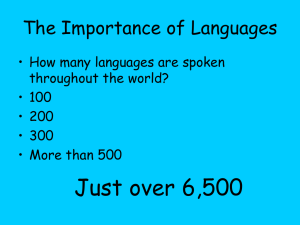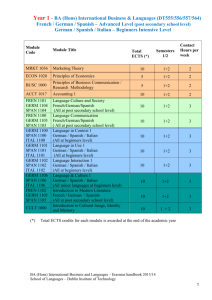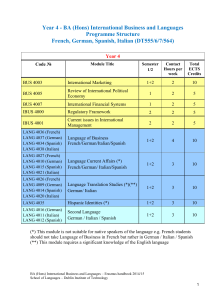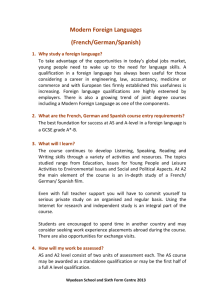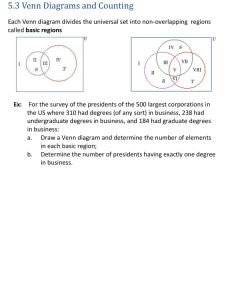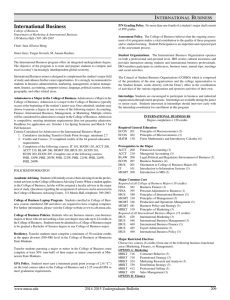IBL 2 Programme Structure and Module Descriptors 2014-2015
advertisement
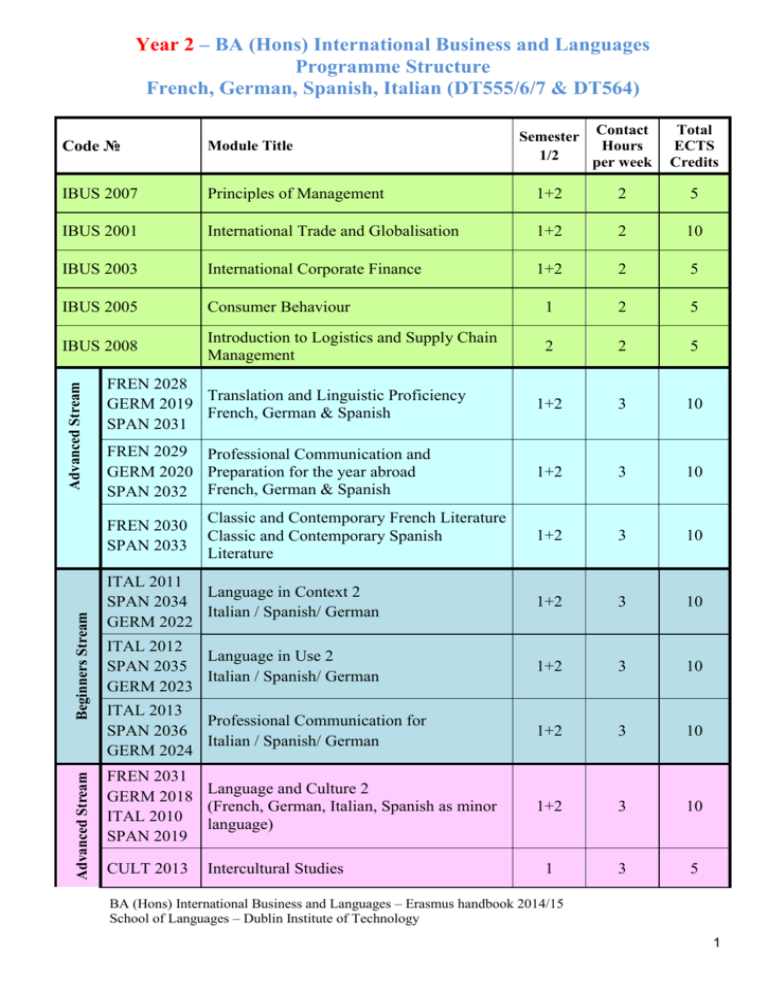
Year 2 – BA (Hons) International Business and Languages Programme Structure French, German, Spanish, Italian (DT555/6/7 & DT564) Semester Contact Hours 1/2 per week Total ECTS Credits Module Title IBUS 2007 Principles of Management 1+2 2 5 IBUS 2001 International Trade and Globalisation 1+2 2 10 IBUS 2003 International Corporate Finance 1+2 2 5 IBUS 2005 Consumer Behaviour 1 2 5 IBUS 2008 Introduction to Logistics and Supply Chain Management 2 2 5 FREN 2028 Translation and Linguistic Proficiency GERM 2019 French, German & Spanish SPAN 2031 1+2 3 10 FREN 2029 Professional Communication and GERM 2020 Preparation for the year abroad SPAN 2032 French, German & Spanish 1+2 3 10 1+2 3 10 ITAL 2011 Language in Context 2 SPAN 2034 Italian / Spanish/ German GERM 2022 1+2 3 10 ITAL 2012 Language in Use 2 SPAN 2035 Italian / Spanish/ German GERM 2023 1+2 3 10 ITAL 2013 Professional Communication for SPAN 2036 Italian / Spanish/ German GERM 2024 1+2 3 10 FREN 2031 GERM 2018 Language and Culture 2 (French, German, Italian, Spanish as minor ITAL 2010 language) SPAN 2019 1+2 3 10 1 3 5 Advanced Stream Code № Advanced Stream Beginners Stream FREN 2030 SPAN 2033 CULT 2013 Classic and Contemporary French Literature Classic and Contemporary Spanish Literature Intercultural Studies BA (Hons) International Business and Languages – Erasmus handbook 2014/15 School of Languages – Dublin Institute of Technology 1 Code № CRIT 2017 Module Title EU Myth in Literature & Culture Semester Contact Hours 1/2 per week 2 3 Total ECTS Credits 5 BA (Hons) International Business and Languages – Erasmus handbook 2014/15 School of Languages – Dublin Institute of Technology 2 BA (Hons) Chinese and International Business (DT565) Programme Structure Semester 1/2 Contact Hours per week Total ECTS Credits Code № Module Title IBUS 2007 Principles of Management 1+2 2 5 IBUS 2001 International Trade and Globalisation 1+2 2 10 IBUS 2003 International Corporate Finance 1+2 2 5 IBUS 2005 Consumer Behaviour 1 2 5 IBUS 2007 Introduction to Logistics and Supply Chain Management 2 2 5 CHIN 2004 Chinese Language: FL5-6 1+2 4 10 CHIN 2001 Chinese Language: FL7-8 1+2 4 10 CHIN 2003 Chinese Language: FL9P 1+2 2 5 CHIN 2002 Chinese Cultural Studies 3 1+2 1 5 BA (Hons) International Business and Languages – Erasmus handbook 2014/15 School of Languages – Dublin Institute of Technology 3 BA (Hons) International Business and Languages Module Descriptors Business Modules Principles of Management International Trade & Globalisation Introduction to Logistics and Supply Chain Management International Corporate Finance The module will build a knowledge base of management and address areas such as the: history of management; organisational goals and objectives; environmental scanning; strategy formulation and implementation; organisational culture; managing change, negotiation; theories and models of leadership; measuring and controlling management performance. Using the base of the first year economics course, the theories of international trade and the systems and institutions which relate to it are analysed. The current situation of international trade is examined. Exchange rate theory and systems and the related institutions are also analysed, as is the role of international capital flows. A historical context is developed within which the effects on developed and developing economies of the changing trade and international financial environment is examined. The role of multinational corporations (MNCs) in the global economy is reviewed. The effect of globalization on the environment is considered. The consequences and controversies relating to globalization are analysed. Logistics can be defined as getting the right product, at the right price, to the right place, in the right quantity, in the right condition, to the right customer at the right time. The changing nature of markets and the globalisation of business has sharpened the focus on the need for better logistics capabilities and supply chain management. Supply chains need to be developed which can deliver the required levels of service at minimum cost. Logistics and supply chain management deals with managing the flow of goods from a business firm's suppliers, through its facilities, and on to its customers. It is of critical importance in establishing a competitive advantage. Proper performance of the logistics functions can contribute to both lower costs and enhanced customer service. While transportation is the heart of logistics, inventory management, warehousing, order processing, materials handling, packaging, plant and warehouse location, and customer service are also important logistics activities. This course examines all aspects of logistics, including some of the techniques and strategies for planning, organising and managing the overall logistics process including the functional areas of forecasting, inventory management and customer service. To provide an introduction to the theory and practice of international corporate finance. BA (Hons) International Business and Languages – Erasmus handbook 2014/15 School of Languages – Dublin Institute of Technology 4 Consumer Behaviour This module provides an introduction to the academic discipline of consumer behaviour. The module will enable students to develop a critical understanding of both historical and contemporary issues in the fields of consumption, consumer research and consumer culture. The emphasis is on gaining an insight into a number of specific areas as outlined in the module content. The module will provide a reflective, comparative and critical approach to consumption behaviour and the role played by marketing processes in relation to it. The module will promote self-directed learning through individual assignments while also fostering group-directed learning through a team-based case study. Language modules for BA (Hons) International Business (DT555 - French, DT556 - German, DT557 - Spanish, DT564 - Italian) This module introduces students to the translation of general and semi-specialised texts, to the research, analysis and writing skills French / German / Spanish required for effective translation and to translation theory. Translation and Linguistic It continues to develop student understanding of Target Language Proficiency culture and language and requires students to improve and advance (Post Leaving Certificate) their written skills, grammatical accuracy and understanding of text structure and composition. The module continues the development of students’ general French / German / Spanish language and intercultural competencies by preparing students for Professional the linguistic and cultural challenges of the year abroad. Communication and This module also introduces students to professional language & Preparation for the year culture and working environments. The module seeks to develops abroad students’ ability to communicate effectively and appropriately in (Post Leaving Certificate) professional environments in the Target Language French / Spanish Classic and Contemporary Literature (Post Leaving Certificate) This module aims to introduce students to many of the historical, theoretical, cultural and aesthetic issues influencing the development of classic and contemporary French literature, particularly the French novel, through the study of a representative selection of key texts. The module focuses on the literature of the Enlightenment, the19th and early 20th century and addresses issues in literature and society in the 20th century. Students read a range of narratives drawn from major literary works and representative of a variety of trends and movements in modern French literature. They study elements of style, narrative structure and character. There is an increased emphasis on critical analysis. This module aims to introduce students to many of the historical, theoretical, cultural and aesthetic issues influencing the development of classic and contemporary Spanish and Latin-American literature, particularly the novel and the theatre through the study of a representative selection of key texts. The module focuses on 19th and 20th century literature, the transition from Realism to Modernism, and addresses issues such as political change, social variations and identity in Spain and Latin-America. Students read a range of narratives drawn from major literary works and representative of a variety of trends and movements in modern Hispanic literature. They study elements of style, narrative structure and character. There is an increased emphasis on critical analysis. BA (Hons) International Business and Languages – Erasmus handbook 2014/15 School of Languages – Dublin Institute of Technology 5 Italian / Spanish Language in Context 2 (Beginners Intensive) Italian / Spanish Language in Use 2 (Beginners Intensive) Italian / Spanish Professional Communication (Beginners Intensive) Language and Culture 2 (minor language, beginners level) This module expands the range of situations in which the learners can express themselves orally and increases their awareness of linguistic accuracy. It also gives learners a more in-depth of knowledge of the culture of the community of speakers of their target language. It facilitates learners’ integration into that community. The module also prepares them for a differentiated study of the country/countries and culture/s of their language of study and for the linguistic and cultural challenges of the year abroad. This module expands the students’ knowledge of their target language and structures. The topics studied in this module will be introduced through a variety of texts in the target language with a particular focus on the lexicon and structures of their language of study. This module also expands on the range of situations in which students can express themselves and increases their awareness of their linguistic accuracy. This module introduces learners to the essential of the commercial, professional y business environment in the countries of their target language. It also provides learners with the basic skills needed to cope in an academic environment through the target language. This Year-Long module consolidates the learners’ introductory skills and builds on them by expanding the range of tasks and situations as well as vocabulary, language structures and cultural background. Intercultural Studies This module is designed to introduce students to the key concepts of culture and their impact on intercultural communication European Myths This course identifies key myths of European modernity in literature and other media. It discusses these myths both as critical tools in understanding modern communication and signification and as evolving literary-cultural contributions to modern European identities. While the course broadly follows European mythology in a chronological fashion, exploring texts paradigmatically, it links the key texts to modernity and contemporary society. Language modules for BA (Hons) Chinese and International Business (DT565) Chinese Language Levels 5 & 6 This module introduces students to lower intermediate-level spoken communicative Chinese. Instruction Material is provided in character-based material with glosses in pinyin. Chinese Language Levels 7 & 8 This module introduces students to lower-intermediate Chinese with increasing focus on the writing system – both simplified and traditional – (emphasis on simplified). Chinese Language Level 9P This module prepares students for spending their third year in a Chinese speaking country (China or Taiwan). BA (Hons) International Business and Languages – Erasmus handbook 2014/15 School of Languages – Dublin Institute of Technology 6 Chinese Cultural Studies 3 This module introduces students to Chinese Economic and geographical contexts with an emphasis the contemporary situation and recent Chinese economic history BA (Hons) International Business and Languages – Erasmus handbook 2014/15 School of Languages – Dublin Institute of Technology 7
